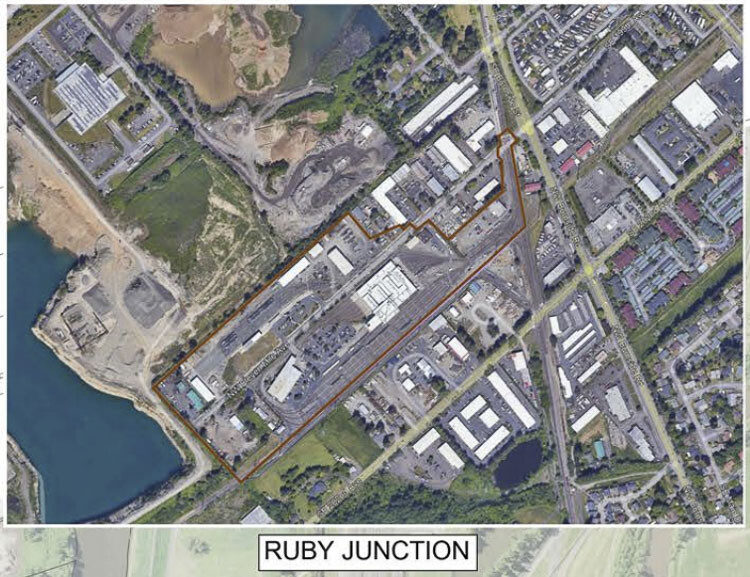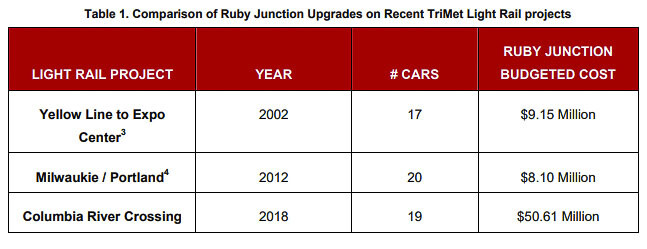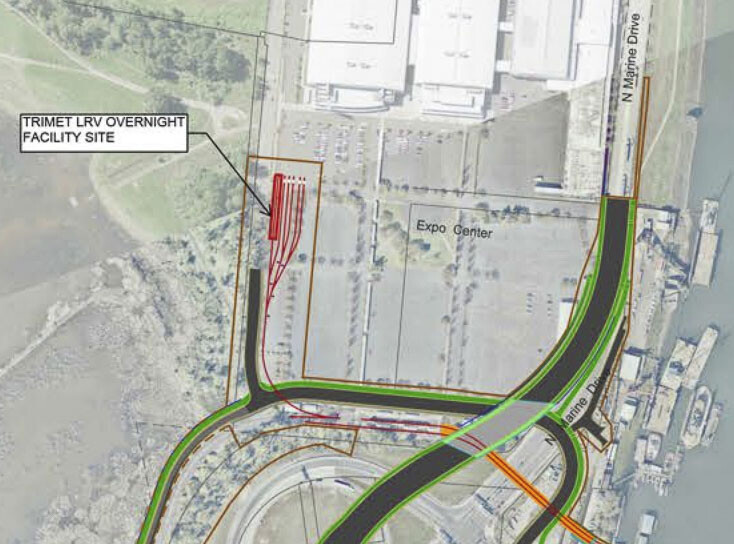Similar to failed CRC project, Ruby Junction expansion part of IBR’s light rail to Vancouver
John Ley
For Clark County Today
The Columbia River Crossing (CRC) was deemed a light rail project in search of a bridge by the Oregon Supreme Court. A graphic at the May 31 Vancouver community forum showed the TriMet Ruby Junction maintenance facility in Gresham as being part of the Interstate Bridge Replacement (IBR) project. It was part of the CRC as well.
The light rail extension is of interest to Clark County residents for a variety of reasons, not the least of which is that they have voted against light rail several times in the past. More recently, it was revealed that Washington taxpayers are being asked to fund $150 million of the cost of the three-mile extension of the MAX Yellow Line into Vancouver.
In 2012, forensic accountant Tiffany Couch revealed multiple parts of the CRC were outside the 5-mile “bridge influence area.” She found a $50.6 million Ruby Junction expansion proposal, an upgrade to Portland’s Steel Bridge, and a new TriMet headquarters. “We question whether the proposed costs of the Ruby Junction and Steel Bridge upgrades represent TriMet system-wide repairs that are potentially being allocated disproportionately to the CRC project as a result of the opportunity of $850 million in federal funding,” Couch wrote.

The IBR is currently proposing an 8-lane bridge – three through lanes in each direction and one auxiliary lane for merging on and off Interstate 5. The failed CRC was a 10-lane bridge. It had the same three through lanes and two auxiliary lanes. The IBR cost estimates range from $5 billion to $7.5 billion, with the high end more than double the CRC price.
What are taxpayers being asked to buy in the IBR? The financial plan indicates the bridge cost is about $500 million; transit costs range from $1.3 billion to $2 billion, The light rail transit component of the CRC was estimated to cost $830 million.
Couch revealed the $50 million expansion of Ruby Junction in the CRC was 450 percent more than the previous two TriMet projects. Nancy Boyd, CRC project director for Washington responded. “To accommodate and complement this addition to the region’s transit system, expansion of the current TriMet light rail maintenance base in Gresham and upgrades to the existing Steel Bridge light rail crossing over the Willamette River in Portland are needed.”
Couch compared three projects – the original Yellow Line construction, the Portland-Milwaukie (Orange Line) construction, and the CRC extension of the Yellow Line into Vancouver. In the original Yellow Line creation to Expo Center, TriMet purchased 17 light rail cars and budgeted $9 million for a Ruby Junction expansion. The Milwaukie line creation included 20 light rail cars and an $8 million expansion of Ruby Junction. The CRC requested 19 light rail cars and $50 million for Ruby Junction for the Yellow Line extension into Vancouver.

A TriMet official confirmed to Clark County Today that 19 new light rail vehicles are part of the IBR plan. It was also confirmed that TriMet officials plan to expand maintenance facilities at the Ruby Junction facility in Gresham, but cost estimates weren’t provided for either.
“The extension of MAX Yellow Line across the Columbia River would require the purchase of 19 additional light rail vehicles, and thus the expansion of the Ruby Junction facility for their storage and maintenance,” said TriMet Public Information Officer Tyler Graf. “This expansion would be west of the existing rail yard and would include new maintenance bays.”
TriMet does not yet know the number of maintenance bays nor the length of track to be included for Ruby Junction expansion. They expect to have more details in 2024 as the design progresses.
The IBR has an “overnight yard” planned for some trains just south of the Expo Center. Graf mentioned that if the overnight facility goes forward, there would be a reduced number of bays and tracks needed at Ruby Junction.
A July 2019 Urban Transport article reports Siemens had won a contract for 26 new S700 light rail vehicles. “This order will replace TriMet’s original 26 Type-1 Bombardier vehicles, built in 1984 – 86,” they reported. The vehicles were needed for “further service expansions such as the MAX Red Line Extension to Fair Complex, and the Southwest Corridor.” Portland metro area voters rejected the $2.9 billion Southwest Corridor light rail extension in November 2019.
TriMet’s Graf didn’t say whether or not their request for 19 light rail vehicles was part of an existing order, or a new order. Currently, TriMet has four new light rail vehicles planned for their “Better Red,” a roughly 10-mile extension of the Red line from Beaverton to Hillsboro.
Is the IBR merely accepting 19 light rail trains originally planned for the Southwest Corridor? Taxpayers might question why 19 new light rail cars are needed for a 3-mile extension of an existing light rail line when only four new light rail vehicles were planned for an extension more than three times longer from Beaverton to Hillsboro.

Also read:
- Opinion: OIC tells consumers not to pay for ‘insurance’ you won’t likely benefit from: Does that include WA Cares?Elizabeth New (Hovde) of the Washington Policy Center believes you should consider yourself warned by the Office of the Insurance Commissioner about WA Cares and its maybe-only benefit.
- Opinion: Same road, different speed limit?Target Zero Manager Doug Dahl addresses a question about speed limit signs going into and leaving town.
- Progress being made at GRO Parade of Homes siteThe 2024 GRO Parade of Homes, presented by the Building Industry Association of Clark County, is a little more than a month away, and builders are busy completing the luxury homes before the big event, scheduled for Sept. 6 through 22 in Felida.
- Has trust in the media tanked over coverage of President Biden’s decline?After President Joe Biden’s calamitous debate performance against former President Donald Trump, and days after Biden’s decision Sunday not to seek reelection, there are still many questions about how the news media covered Biden’s mental and physical decline.
- Opinion: Hiding the growing cost of the Interstate Bridge replacementJoe Cortright of the City Observatory addresses the rising cost of the Interstate 5 Bridge replacement project.
- Letter: ‘This election I am NOT voting for Greg Cheney’Clark County resident Wynn Grcich shares her thoughts on Rep. Greg Cheney and the issue of fluoridation in area drinking water.
- Major gas line leak closes major arterial in Clark CountyFirefighters from Clark County Fire District 6 responded Thursday (July 25) afternoon to the scene of a major natural gas leak on NE 99th Street, directly in front of Columbia River High School.











